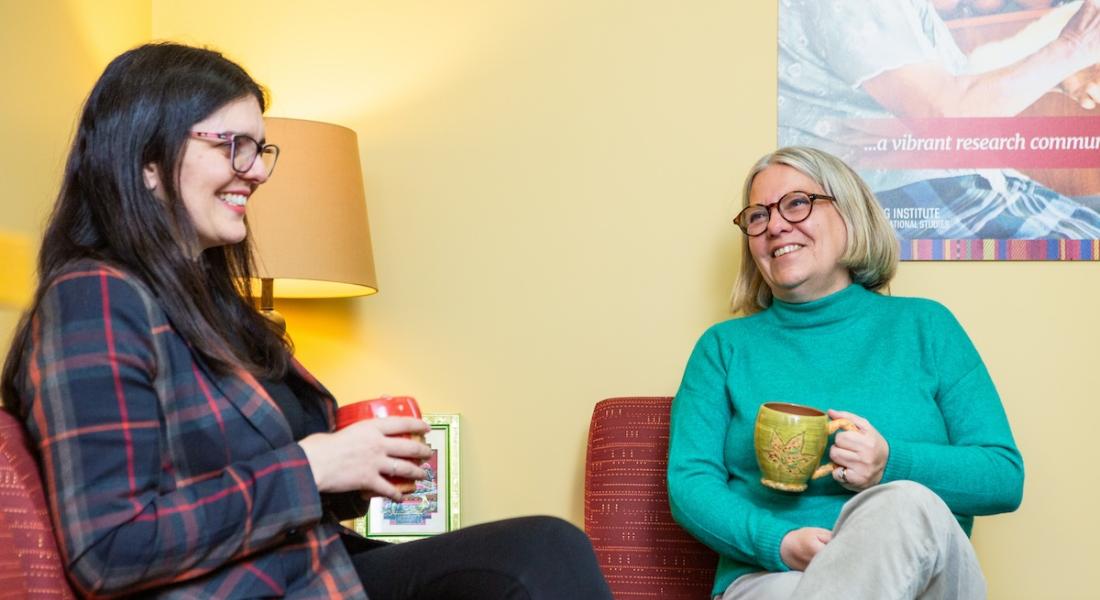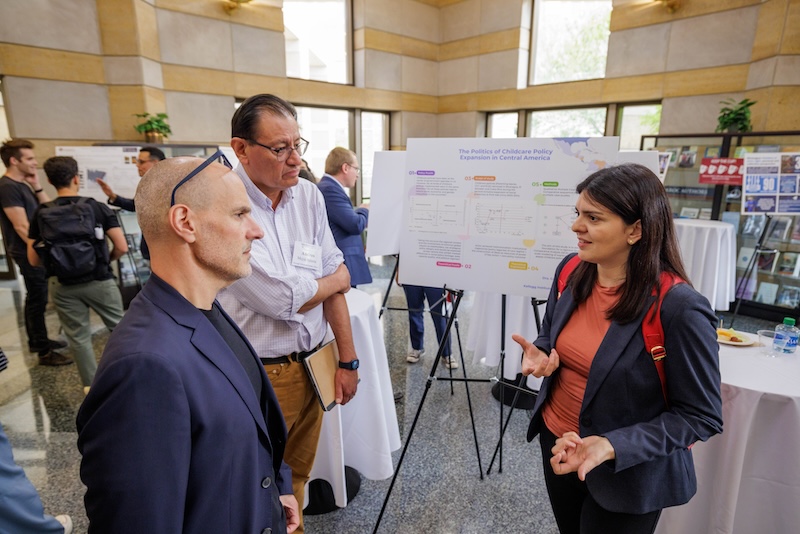
“The academic environment can sometimes feel so closed – I want my work to have a farther reach, to make an impact on society,” states Gabriela Lucía Marzonetto, a Kellogg Institute visiting fellow who works to promote her research findings on early child care to governmental and non-governmental organizations in Latin America.
Not all scholarship has a practical application to current issues, but when it lends itself to the realm of policy or practice – and the researcher is willing to take the extra steps to promote it outside the academy – it can be very rewarding. This year, the Kellogg Institute awarded visiting fellowships for two scholars, including Marzonetto, who are particularly motivated by the policy implications of their work and the desire for their research to make a real-world difference.
“Most of my work is applied rather than theoretical,” says visiting fellow Pelusa Orellana, Kellogg’s Chilean Fulbright Chair in Democracy and Human Development for this spring, who studies policies and programs promoting childhood literacy.
Both scholars are looking at policies that affect young children, recognizing that experiences at younger ages can have profound effects on later years. Orellana is studying successful literacy policies in the United States with the hope that they might be transferable to Chile; Marzonetto compares early childcare programs among Latin American countries, with an eye toward replicating successful programs in countries where programs fall short.
Marzonetto, who hails from the National University of Cuyo in Mendoza, Argentina, specializes in the politics of childcare policies in Latin America, analyzing the effects and the political determinants of childcare policy and its outcomes, with particular expertise in the Southern Cone. At Kellogg she is working to expand her knowledge – and influence – to Central America, conducting interviews with policy makers who are working on Costa Rica, Nicaragua, and El Salvador.
“I look at programs instituted in Latin America from, for example, the World Bank, UNICEF, UNESCO, the WHO, and others. At first glance you see comparable programs in every country – with the same or similar names, following the same sets of guidelines, and so forth. Yet their success rates vary widely,” explains Marzonetto. “When you look at a deeper level, you can see the assorted reasons for this.”
 She gives examples of the implementation differences that translate to lower success, such as, when a program is located in the middle of a dangerous area, fewer people participate for safety reasons; when the hours of a program are limited and do not take into account work or school schedules of families who would otherwise participate; or when services are provided in only one language, neglecting whole populations of people who speak, say, an indigenous language in the area. Marzonetto studies the effects of these differences and plans to summarize her findings in a policy brief making recommendations to improve under-performing programs.
She gives examples of the implementation differences that translate to lower success, such as, when a program is located in the middle of a dangerous area, fewer people participate for safety reasons; when the hours of a program are limited and do not take into account work or school schedules of families who would otherwise participate; or when services are provided in only one language, neglecting whole populations of people who speak, say, an indigenous language in the area. Marzonetto studies the effects of these differences and plans to summarize her findings in a policy brief making recommendations to improve under-performing programs.
Marzonetto maintains the academic side of her work as well, with three products in the pipeline for her current research: a chapter in an edited volume on Central American social policy from Universidad Nacional de Costa Rica, a co-authored chapter (with former Kellogg Visiting Fellow Juliana Martinez Franzoni) for a handbook on Latin American social policies, and a presentation of preliminary findings at the International Association for Feminist Economics (IAFFE) conference at the Universita La Sapienza in Rome in July.
With Orellana’s research focused on literacy, reading motivation, and teacher training, at Kellogg she is working on a research project titled "Examining Public Policy to Guarantee Access to High Quality Literacy Education." She is looking closely at public policy in the US that promotes literacy in schools.
Orellana, who is a professor and researcher at the Universidad de los Andes in Santiago, explains that her interest in literacy lies in the fact that it is so fundamental to the success of the rest of a child’s education, which in turn affects the child’s ability to realize his or her full potential as a contributing citizen and as a human being more generally.
Her path has always been practical. When she first began researching literacy, Chile used standardized testing that generated only broad data.
“There was nothing available that made assessments at a granular level, nothing that, for example, looked at the strengths and weaknesses of individual students – we needed data that could help us pick apart the real needs so that we could see how to improve literacy.”
With no such tools in place or on the horizon, Orellana and her collaborators decided to create them. The Ministry of Education then began using these new assessment tools right away, so the needed data started flooding in – until the pandemic in 2020 halted this kind of testing, which was never resumed with a change in the federal administration.
Given the current state of education in Chile, especially after the poor reading scores following the pandemic, Orellana hopes her research into US policies that positively affect literacy can be implemented in Chile, like standardized literacy testing in kindergarten, which she calls “crucial.”
In another example, she has found that in the US, reading specialists are plentiful and readily available to students who need extra help, which makes a huge difference in literacy levels.
“Having a policy that for example says each school needs to have one reading specialist on staff would do wonders in Chile,” she explains.
Both Marzonetto and Orellana have found their time at Kellogg to be invaluable in working toward their goals for impact. They are especially thankful for the people they’ve met and connections they’ve made at Notre Dame. From getting policy impact advice from Keough School colleagues – like Kellogg Faculty Fellow Andrés Mejía Acosta, Dean of Policy and Practice – to making collaboration connections with other researchers and campus organizations – like the partnership Orellana has forged with the Institute for Educational Initiatives that she hopes to continue beyond her Kellogg fellowship – they both are grateful for the people of Kellogg, Keough, and the larger university.
As for next steps in the policy realm, Marzonetto will take her research to other advocates for the “right to care” in Argentina through the group Compromiso por los Cuidados. Additionally she plans to share her findings within Carework Network, an organization that unites scholars and advocacy groups working on care policies, where she will be undertaking a leadership position.
“I am committed to translating data results into policies by engaging in conversations with government leaders and through different organizations,” says Orellano about her plans after her Kellogg fellowship ends. “I believe that by linking the two worlds of scientific research and public policy, we can ensure that all children learn to read and be competent in reading.”
The Kellogg Institute for International Studies, part of the Keough School of Global Affairs at the University of Notre Dame, is an interdisciplinary community of scholars and students from across the University and around the globe that promotes research, provides educational opportunities, and builds partnerships throughout the world on the themes of global democracy and integral human development.





